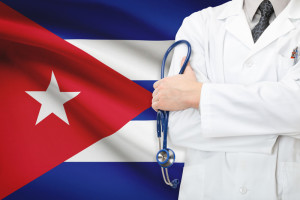You will be hearing a lot about Cuba after the death of Fidel Castro. I am certainly not an expert on Cuba, but I learned a lot about the country and its people recently on an 8-day Road Scholar tour.  And I was particularly interested in learning about their healthcare system.
And I was particularly interested in learning about their healthcare system.
“I wanted to see and experience Cuba before it drastically changes with American influence and investment”. That was the sentiment from many of our fellow travelers.
The trip was called “People and Society: Cienfuegos to Havana”. It included day trips to Trinidad and Santa Clara plus a stop at the Bay of Pigs on our way to Havana. Everywhere we went, we experienced the cultural arts first hand – music and dance from young grade school age students to seniors well into their 80’s. We heard a chamber orchestra and saw a contemporary dance show.
We heard lectures on history, politics, and religion as well as how Cuban millennials view the future. We learned how negatively the U.S. embargo has impacted the people of Cuba. And how they want the embargo fully lifted but with future U.S. investments and development managed.
We had a chance to sit and talk for an hour with a young man who works in a telecom job in health care. I asked about electronic health records and he said they are in the process of implementing a system they have developed.
When I got home and caught up on my email, I learned that a 15-member delegation of healthcare executives visited Cuba while we were there. That delegation was led by former HHS Secretary and Governor Mike Leavitt, and included Dr. David Blumenthal, former National Coordinator at ONC and Stephen Lieber, HIMSS president and CEO. Stephen wrote an insightful blog on the experience. The delegation was a mix of vendor, consulting and provider executives who had gone to see the Cuban healthcare delivery system up close.
On our Road Scholar trip, we learned about the health care system more broadly from our tour guide. There is clearly an emphasis on prevention and as Stephen Lieber says, it is truly a patient centric approach.
There are multiple levels to the delivery system. At the base level where the emphasis is on prevention is the family physician and nurse who are assigned to a group of families. They know them well as they live in the same community. The doctor and nurse maintain the health records for those in their care. They have office hours in the morning and in the afternoon visit seniors in their homes.
The next level up are public clinics that provide specialists, lab services, and small wards for surgery or rehab services. The next level are hospitals and at the highest level are institutes and research centers.
Health care is free at all levels for all patients.
More than 50% of physicians are women. Our tour guide noted that more than 50% of all professionals are women. Most likely a sign of the education system and a focus on developing equally both men and women in all sectors.
As noted in a Forbes article from 2 years ago entitled “Cuba’s Surprisingly Cost Effective Healthcare”, outcomes are impressive. Life expectancy is almost identical between Cuba and the U.S. Infant mortality in Cuba is lower than the U.S.
Everyone we spoke to was friendly and gracious. They asked us to go back to the U.S. and tell people that Cuba is neither a socialist heaven nor a communist hell. They want the U.S. embargo lifted and to see continued efforts to normalize relations between our countries. I hope that more Americans can visit Cuba in the months ahead and understand who they are and their hopes for the future. And that our leaders will continue to improve relations between our two countries.
Suggested reading on health care in Cuba:
Walking the Talk of Patient-Centric Healthcare in Cuba
Prevention Better than Cure in Cuban Healthcare System
Cuba’s Surprisingly Cost-Effective Healthcare

Sowmya Moorthy on said:
Wonderful insight Sue! Thanks for sharing. Trust you had a relaxing Thanksgiving Weekend. happy Holidays.
Sowmya
Sue Schade on said:
Sowmya, Thanks!! Always good to learn about other health care models. Happy holidays to you as well!
Adrian Shepard on said:
You do know that Cuba doesn’t measure infant mortality the same way as the rest of the world, right? Neither can you take any of its self-reported health statistics at face value given the oppressive and non-transparent nature of the government there. Even the UN doesn’t trust any data coming out of Cuba.
You’re talking about a country that still has outbreaks of cholera. Let’s not pretend they have some sort of magic healthcare system that we should look to.
Sue Schade on said:
Adrian, thanks for the comment. Don’t consider it a magic healthcare system but they are doing some things very well with their emphasis on family medicine and prevention.